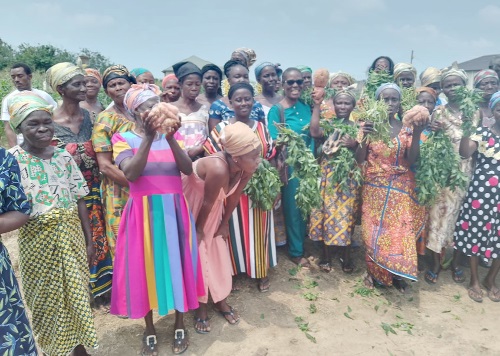The Accelerating Impacts of CGIAR Climate Research for Africa (AICCRA) Ghana project is training 121 female farmers out of more than 1,000 farmers in the Central Region on a new farming technologies.
The Consortium of International Agricultural Research Centres (CGIAR) is a global partnership that unites organisations engaged in research for a food secure future.
The AICCRA project has 31 demonstration farms in 22 communities across six regions. These are the Greater Accra, Central, Bono East, Northern, Upper East and Upper West regions.
In the Central Region the project is being undertaken in the Cape Coast Metropolis and the Komenda-Edina-Eguafo-Abrem Municipality with attention on identified improved varieties of maize, cowpeas and sweet potatoes.
The participating farmers were taken through demonstrations on the Mempeasem demonstration farms last week.
Auntie Maanan, one of the 121 female farmers commended the organization for the new technologies introduced to the females farmers to improve the livelihoods of the farmers in the region.
She mentioned that though she farms sweet potatoe, the new technologies that has been introduced, thus Orange Fleshed Sweet Potatoes is new to her and would need to cultivate it to boost the health benefits and income of her family.
The orange fleshed sweet potato, which derives its name from its orange colour is known to have enormous health benefits, including its ability to help gain weight and boost immunity.
It is also known to help ease digestion and treat bronchitis, arthritis and stomach ulcers, prevent dehydration and help control diabetes.
The OFSP is a great source of Vitamin A and hence helps prevent Vitamin A deficiency and is mainly used as baby foods due to its properties as an all-in-one food benefit. It can be eaten uncooked or boiled.
“I grow the white potatoes but I have taken stems (stolons) for planting. It’s healthy and with the practices we have been taught I believe the harvests will be good,” she said.
Another farmer, Monica Amonoo, said the good agronomic practices learnt under the project had positively impacted her farm yields and urged the participants to adopt them.
Senior Research Officer at the CSIR-CRI working on the project, Dr Stephen Yeboah, explained that women remained critical to the well-being of families and the involvement of the women farmers was essential if the project was to achieve its goals of ensuring food security and health for all.
He observed that in the face of climate change it was important that farmers understood the relevance of their crops to the health and socio-economic welfare of their families and their communities.
“It is necessary that they don’t just grow but grow crops with essential food nutrients necessary for healthy growth and development and that is what this project seeks to do,” he stated.
Neem technology
The introduction of the “neem technology” where powder from neem leaves is applied to the soil before planting the potatoes to prevent nematodes attacking the potatoes was a plus for the farmers.
Farmers were taught how to apply the neem powder in planting the potatoes and other crops to get the best yields.
Dr Yeboah said maize varieties such as the Opeaburo, Atika Denbea, and Ahofew were all bio-fortified varieties with disease resistant character, to ensure farmers got the most from their farms and fortified food for their families and for sale.
He said it was important that farmers were equipped with local and cheaper solutions to problems for better outcomes in the face of climate change and its impact on farming.
The Central Regional officer of Women in Agriculture Development urged the farmers, especially the women, to be advocates in the communities and to use the knowledge acquired to boost yields.
The Cape Coast Metropolitan Director of Agriculture, Olympia Williams, urged farmers to remain critical in food security, adding that the project was also to improve the nation’s food security.








